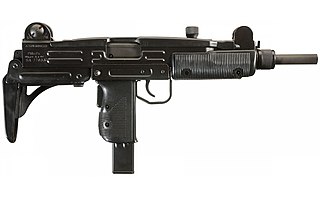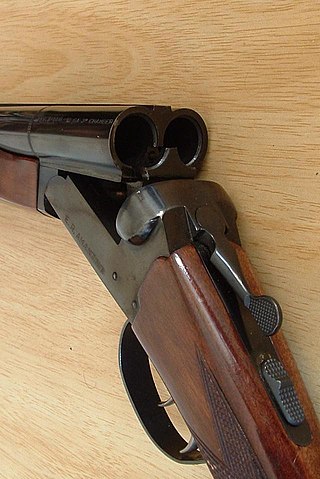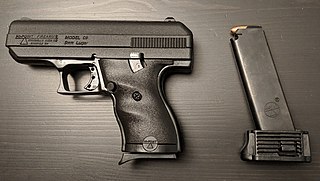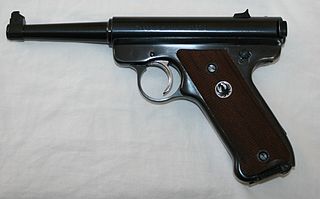
A carbine is a long gun that has a barrel shortened from its original length. Most modern carbines are rifles that are compact versions of a longer rifle or are rifles chambered for less powerful cartridges.

In firearm designs, the term single-shot refers to guns that can hold only a single round of ammunition inside and thus must be reloaded manually after every shot. Compared to multi-shot repeating firearms ("repeaters"), single-shot designs have no moving parts other than the trigger, hammer/firing pin or frizzen, and therefore do not need a sizable receiver behind the barrel to accommodate a moving action, making them far less complex and more robust than revolvers or magazine/belt-fed firearms, but also with much slower rates of fire.

The Uzi is a family of Israeli open-bolt, blowback-operated submachine guns and machine pistols first designed by Major Uziel "Uzi" Gal in the late 1940s, shortly after the establishment of the State of Israel. It is one of the first weapons to incorporate a telescoping bolt design, which allows the magazine to be housed in the pistol grip for a shorter weapon.

In firearms terminology, an action is the functional mechanism of a breech-loading firearm that handles the ammunition cartridges, or the method by which that mechanism works. Actions are technically not present on muzzleloaders, as all those are single-shot firearms with a closed off breech with the powder and projectile manually loaded from the muzzle. Instead, the muzzleloader ignition mechanism is referred to as the lock.

The Colt AR-15 is a lightweight, magazine-fed, gas-operated semi-automatic rifle. It is a semi-automatic version of the M16 rifle sold for the civilian and law enforcement markets in the United States. The AR in AR-15 stands for ArmaLite rifle, after the company that developed it in the 1950s. Colt's Manufacturing Company currently owns the AR-15 trademark, which is used exclusively for its line of semi-automatic AR-15 rifles.

The .45 Reising submachine gun was manufactured by Harrington & Richardson (H&R) Arms Company in Worcester, Massachusetts, USA, and was designed and patented by Eugene Reising in 1940. The three versions of the weapon were the Model 50, the folding stock Model 55, and the semiautomatic Model 60 rifle. Over 100,000 Reisings were ordered during World War II, and were initially used by the United States Navy, Marine Corps, and the United States Coast Guard, though some were shipped to Canadian, Soviet, and other allied forces to fight the Axis powers.

The Mini-14 is a lightweight semi-automatic rifle manufactured by Sturm, Ruger & Co. Introduced in 1973, the design was outwardly based on the M14 rifle and is, in appearance, a scaled-down version chambered in 5.56×45mm NATO, though with its own gas system design.
The SUB-2000 is a pistol-caliber carbine manufactured by Kel-Tec CNC Industries of Cocoa, Florida, United States. The rifle is a blowback operated, semi-automatic firearm with its operating spring located in the tubular stock.
The Ruger 10/22 is a series of semi-automatic rifles produced by American firearm manufacturer Sturm, Ruger & Co., chambered for the .22 Long Rifle rimfire cartridge. It uses a patented 10-round rotary magazine, though higher capacity box magazines are also available. The standard carbine version of the Ruger 10/22 has been in production continuously since 1964, making it one of the most successful rimfire rifle designs in history, with numerous third party manufacturers making parts and accessories for upgrading and customization. The 10/22's aftermarket is so prolific that a complete 10/22 can be built without using any Ruger-made components.

The Ruger P series is a line of centerfire semi-automatic pistols made by Sturm, Ruger & Company produced from 1985 to 2013. The P-series pistols were designed for military, police, civilian and recreational use. The designs are largely based on the Browning action found in the M1911 pistol, but with minor variations, generally related to the safety mechanism and the barrel-camblock interface. Reviews have considered them rugged, reliable, and strong, though this strength comes at the price of bulk and a blocky appearance.

Hi-Point Firearms, also known as Strassell's Machine, Inc, is an American firearms manufacturer based in Mansfield, Ohio. All of their firearms are manufactured in several different locations in Ohio.

The ArmaLite AR-7 Explorer is a semi-automatic firearm in .22 Long Rifle caliber, developed in 1959 from the AR-5 that was adopted by the U.S. Air Force as a pilot and aircrew survival weapon. The AR-7 was adopted and modified by the Israeli Air Force as an aircrew survival weapon in the 1980s.
The Marlin Model 60, also known as the Marlin Glenfield Model 60, is a semi-automatic rifle that fires the .22 LR rimfire cartridge. Produced by Remington Arms in Huntsville, Alabama formerly in Mayfield, Kentucky, formerly by Marlin Firearms Company of North Haven, Connecticut, it was in continuous production from 1960 to 2020 and the company says it is the most popular rifle of its kind in the world. Major features include a micro-groove barrel, a cross-bolt safety, hardwood stock with Monte Carlo comb, and brass or blued steel inner magazine tube. The Marlin Model 795 is a very similar rifle and based on the Marlin Model 60, changed only to accept a detachable box magazine.
The Marlin Model 336 is a lever-action rifle and carbine made by Marlin Firearms. Since its introduction in 1948, it has been offered in a number of different calibers and barrel lengths, but is commonly chambered in .30-30 Winchester or .35 Remington, using a 20- or 24-inch barrel. Currently, the model with a 24-inch barrel is only available in .30-30 Winchester. The Model 336 is now back in production as of March 27, 2023.

The Claridge Hi-Tec and its antecedent the Goncz High-Tech Long Pistol are semi-automatic pistols designed by Hungarian inventor Lajos John Goncz. This unique firearm features a telescopic bolt design encased in a tubular upper receiver with a forged steel frame, button rifled match barrels, and 16-round magazines standard.

The Hi-Point Model C-9 is a polymer-framed, semi-automatic, blowback-operated pistol manufactured by Hi-Point Firearms. It is chambered in 9×19mm Parabellum and is rated to accept +P ammunition. It became well known for its low retail price of under $200. An improved model, the YC9, was originally expected for release by late 2019, but was finally released for sale in August 2023.
The SG 550 is an assault rifle manufactured by SIG Sauer AG in Switzerland. "SG" is an abbreviation for Sturmgewehr. The rifle is based on the earlier 5.56×45mm NATO SIG SG 540.

The M6 is a series of carbines designed and manufactured by LWRC International. It is based on the M4 carbine, with which it shares 80% of its parts. The 'M' model name is not a US military designation. Like the HK416, it features a proprietary short-stroke self-regulating gas piston system and bolt carrier/carrier key design, which prevents trapped gases from contacting the bolt carrier or receiver of the weapon. The manufacturer claims that this reduces the heating and carbon fouling of the internals, simplifies field maintenance, and improves reliability.

The KRISS Vector is a series of weapons based upon the parent submachine gun design developed by the American company KRISS USA, formerly Transformational Defense Industries (TDI). They use an unconventional delayed blowback system combined with in-line design to reduce perceived recoil and muzzle climb, invented by French engineer Renaud Kerbrat.

The Ruger Standard Model is a rimfire semi-automatic pistol introduced in 1949 as the first product manufactured by Sturm, Ruger & Co., and was the founding member of a product line of .22 Long Rifle cartridge handguns, including its later iterations: the MK II, MK III, and MK IV. It is marketed as an inexpensive .22 caliber rimfire intended for casual sport and target shooting, and plinking. Designed by company founder William B. Ruger, the Standard model and its offspring went on to become the most accepted and successful .22 caliber semi-automatic pistols ever produced.
















